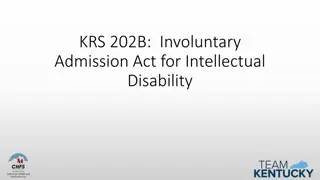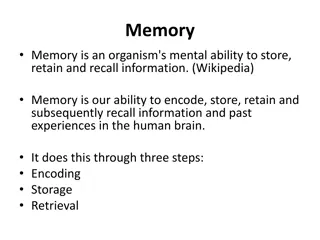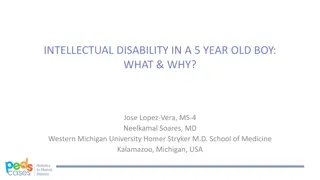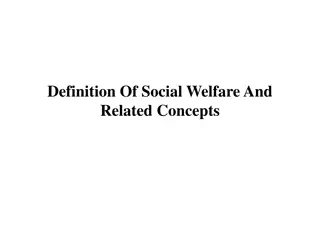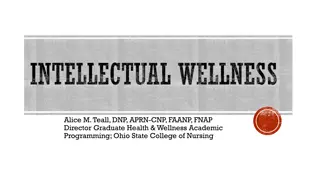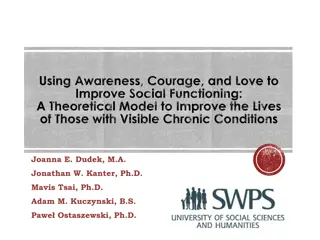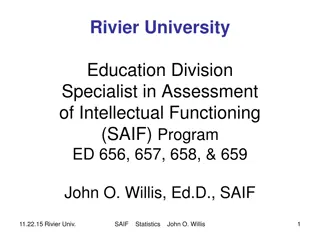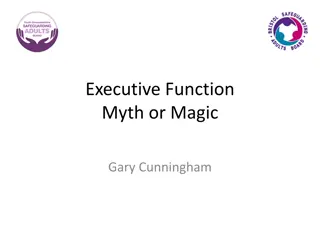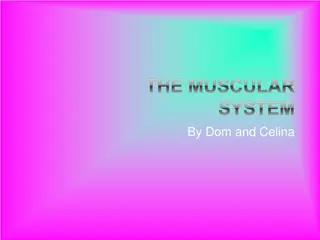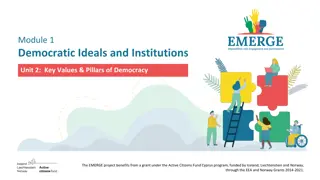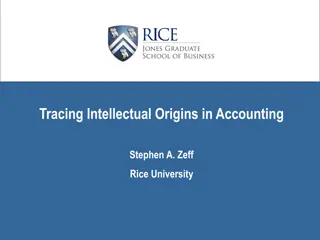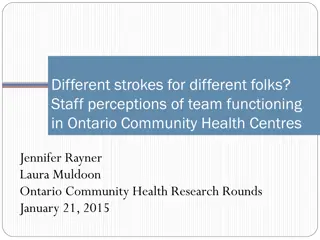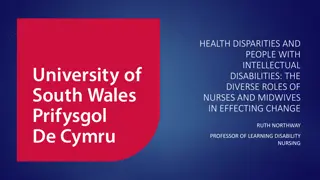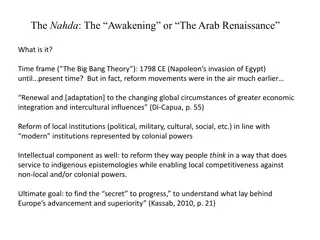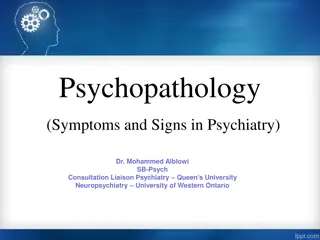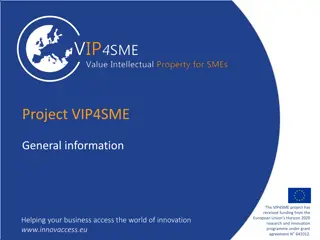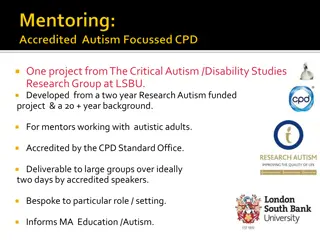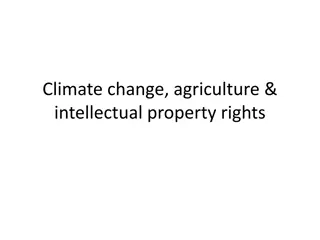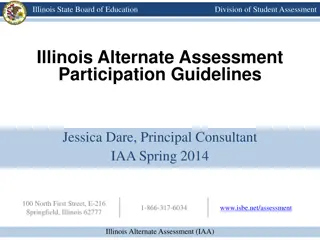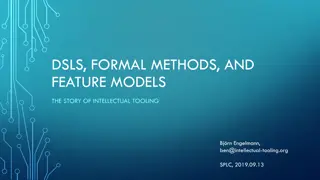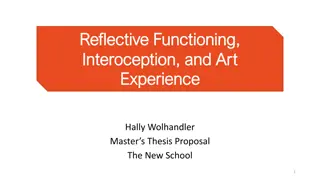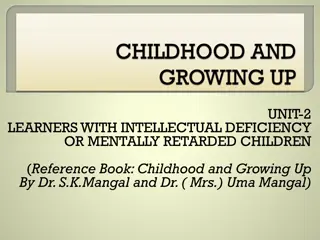Intellectual Property Rights and Technology Business Management Courses
Explore post-graduate and certificate courses on Intellectual Property Rights and Technology Business Management offered by renowned professors and industry experts. Learn about patents, technology transfer, creativity, and innovation. Various pricing options available for corporate, students, facul
1 views • 7 slides
Understanding Mental Deficiency: Causes and Classifications
Mental deficiency, also known as intellectual disability, is characterized by significantly below-average intellectual functioning before the age of 18, along with limitations in adaptive behaviors. It is measured using standardized IQ tests, with classifications ranging from profound to mild. Two m
3 views • 65 slides
Understanding Kentucky's KRS.202B Involuntary Admission Act for Intellectual Disability
Kentucky's KRS.202B allows for the involuntary admission of individuals with intellectual disabilities to Intermediate Care Facilities for Individuals with Intellectual Disability (ICF/IID). The process involves filing a petition in district court, evaluation by two certified evaluators, and coordin
0 views • 25 slides
Exploring Spiritual Pathways: Relational and Intellectual Journeys
Journey through the Relational and Intellectual Pathways of spirituality, where connections with others and engagement of the mind lead to profound spiritual growth and closeness to the divine. Discover how different individuals connect with God through relationships and intellectual pursuits, enric
0 views • 11 slides
Developmental Disability Eligibility Reform Amendment Act of 2022 Overview
The Developmental Disability Eligibility Reform Amendment Act of 2022 introduces new definitions, eligibility criteria, and expands services for individuals with developmental disabilities. It defines intellectual disability, developmental disability, and introduces substantial functional limitation
3 views • 13 slides
Understanding the Basics of Memory Functioning
Memory is the mental ability to store, retain, and recall information through encoding, storage, and retrieval processes. It involves sensory, short-term, and long-term memory stages, with encoding encompassing semantic, acoustic, and visual aspects. The retrieval process involves locating and recov
0 views • 20 slides
Understanding Intellectual Disability in a 5-Year-Old Boy
This case study discusses the diagnosis and severity of intellectual disability (ID) in a 5-year-old boy, distinguishing between developmental delay and ID. It covers the importance of genetic testing, particularly in cases like Fragile X syndrome, as well as the evolution of assessing ID severity b
0 views • 21 slides
Understanding Social Welfare and Related Concepts
Social welfare encompasses a nation's system of programs, benefits, and services designed to address social, economic, educational, and health needs essential for societal well-being. The functional perspective emphasizes individual interdependence and societal efficiency, while the descriptive view
1 views • 9 slides
Cognitive Stimulation Therapy in Post-Acute Care: A Pilot Study
Cognitive Stimulation Therapy (CST) is an evidence-based group intervention designed for individuals with mild to moderate cognitive impairment. It aims to enhance cognitive functioning through various activities such as executive functioning tasks, multi-sensory stimulation, and reminiscence work.
0 views • 9 slides
Enhancing Your Intellectual Wellness: Tips and Benefits
Understanding and promoting intellectual wellness is crucial for lifelong learning, critical thinking, and personal growth. This article presents insights into intellectual wellness, its importance, signs of being intellectually unwell, steps to improve it, and engaging challenges to boost your cogn
0 views • 8 slides
Comprehensive Approach to Enhancing Social Functioning in Visible Chronic Conditions
This theoretical model explores the impact of visible chronic differences (VCDs) on individuals, emphasizing stigmatization and societal norms. It discusses the importance of social connection, highlights risks associated with VCDs, and presents the benefits of Functional Analytic Psychotherapy (FAP
0 views • 23 slides
SAIF Program at Rivier University: Assessment of Intellectual Functioning
Rivier University's Education Division offers the Specialist in Assessment of Intellectual Functioning (SAIF) Program led by John O. Willis, Ed.D. The program involves courses ED.656, .657, .658, and .659 focusing on statistics, test scores, measurement, and psychometrics. Resources from experts lik
0 views • 92 slides
Understanding Voluntary Manslaughter and Diminished Responsibility in Criminal Law
Voluntary manslaughter is a legal concept where certain special defenses can reduce a murder charge to manslaughter, giving judges discretion in sentencing. Diminished responsibility, introduced by the Homicide Act, allows individuals suffering from abnormal mental functioning during a killing to ha
0 views • 23 slides
Understanding America Study: Cognitive Functioning Measures
The Understanding America Study (UAS) focuses on developing web-based cognitive functioning measures, including tests for fluid abilities, verbal skills, executive function, and processing speed. Utilizing data from about 9,000 panelists, tests like the Stop and Go Switch task are administered onlin
0 views • 26 slides
Understanding Executive Functioning and Executive Dysfunction
Executive Functioning is a key aspect of cognitive function, encompassing various abilities such as planning, self-awareness, and emotion regulation. Executive Dysfunction, often resulting from frontal lobe injuries, can lead to difficulties in decision-making, social interactions, and learning. Thi
1 views • 21 slides
Understanding the Muscular System: Functions & Importance
Muscles are essential for movement, posture, circulation, and digestion in the human body. Without a properly functioning muscular system, vital processes like breathing and food digestion would be compromised. Maintaining muscle health through exercise and a nutritious diet is crucial to ensure opt
0 views • 11 slides
Understanding Intellectual Freedom in American Society
Explore the concept of intellectual freedom as a core value in American society, emphasizing the importance of liberty, democracy, and the exchange of ideas. Academic and intellectual freedom are crucial for the advancement of knowledge and the functioning of a democratic society, allowing individua
0 views • 45 slides
Institutional Framework and Antitrust Law in the EU
The European Union's institutional framework is defined by the Treaties of Lisbon, European Union, and Functioning of European Union. These treaties establish the EU's objectives, governance principles, and delineate competences. Additionally, EU antitrust law principles are based on the Treaties of
0 views • 16 slides
Understanding Neurodevelopmental Disorders in Childhood and Adolescence
Neurodevelopmental disorders in childhood and adolescence encompass a range of conditions including intellectual disabilities, communication disorders, autism spectrum disorder, and attention deficit/hyperactivity disorder. These disorders impact cognitive development, adaptive functioning, and comm
0 views • 30 slides
Understanding the Principles of a Functioning Democracy
A functioning democracy is built on principles such as the ultimate authority of the people, essential rights like freedom of expression, adherence to human rights, and the government's legitimacy from the electorate. Principles like accountability, freedom of assembly, and the separation of powers
0 views • 20 slides
Tracing Intellectual Origins in Accounting: A Journey of Thought Evolution
Tracing the intellectual origins in accounting reveals the roots and influences behind current theories and practices. This process involves connecting the dots across decades to understand the intellectual baggage inherited from the past. Different streams of thought in US accounting literature, st
0 views • 41 slides
Analysis of Disability Data Using U.S. National Health Interview Survey
The U.S. National Health Interview Survey (NHIS) conducts an annual cross-sectional household survey to collect data on various health aspects, including disability. The Functioning and Disability module within NHIS includes a set of questions to assess difficulties in areas such as vision, hearing,
0 views • 49 slides
Enhancing Team Functioning in Ontario Community Health Centers
Explore the importance of team function in Ontario Community Health Centers (CHCs) and how it impacts quality of care delivery and innovation in primary care. Understand the dynamics of inter-professional teamwork, the multi-faceted concept of team function, and the potential for interventions to im
0 views • 35 slides
Addressing Health Disparities in People with Intellectual Disabilities: Roles of Nurses and Midwives
People with intellectual disabilities face significant health disparities, including multiple long-term health conditions and higher mortality rates. Nurses and midwives play diverse roles in addressing these disparities through research and inclusive practices. Common conditions include epilepsy, o
0 views • 20 slides
Emerging Trends in Arab Renaissance and the Evolution of Arabic Literature
The Nahda, or Arab Renaissance, initiated in the late 18th century, marked a period of reform and adaptation in Arab societies, aiming to align with modern institutions and promote intellectual advancement. This movement sought to embrace progress, foster rationality, and understand civilization's r
0 views • 5 slides
Understanding Psychopathology: Symptoms and Signs in Psychiatry
Psychopathology involves the study of symptoms and signs in psychiatry, where signs are objective observations and symptoms are subjective experiences. Mental disorders encompass a range of issues affecting thoughts, emotions, behaviors, and relationships. Recognizing signs and symptoms such as slee
0 views • 31 slides
Overview of Classification of Psychiatric Disorders
Psychiatric disorders are illnesses with various manifestations that impact functioning due to disturbances in biological, social, genetic, and other factors. Two key classification systems, ICD-10 and DSM-5, categorize over 200 types of psychiatric illnesses. The ICD-10 includes categories like org
0 views • 18 slides
VIP4SME Project - Enhancing Intellectual Property Support Services for SMEs
The VIP4SME project, funded by the European Union's Horizon 2020 program, aims to raise awareness among Small, Medium, and Micro Enterprises (SMEs) about the value of intellectual capital and enhance Intellectual Property (IP) support services. With a consortium of partners across Europe, the projec
0 views • 6 slides
Understanding Autism & Disability: Mentor Training and Executive Functioning
This project from The Critical Autism/Disability Studies Research Group at LSBU focuses on mentor training for working with autistic adults, emphasizing goal-setting, action prioritization, time management, and social interactions. It explores concepts like executive functioning, individuality stren
0 views • 15 slides
Challenges at the Intersection of Climate Change, Agriculture, and Intellectual Property Rights
The impacts of climate change on agriculture and the implications for intellectual property rights are explored in this content. Extreme weather events and rising temperatures are creating challenges for farmers, particularly those in developing countries who rely on subsistence agriculture. The eco
0 views • 47 slides
Illinois Alternate Assessment Participation Guidelines
The Illinois State Board of Education's Division of Student Assessment provides guidelines for participation in the Illinois Alternate Assessment (IAA). Students with significant cognitive disabilities, typically with intellectual functioning below average and impairments in adaptive functioning, ar
0 views • 9 slides
Intellectual Property in Plant Biotechnology: Importance, Protection, and Implications
Understanding the significance of intellectual property in plant biotechnology is vital for innovation and development. It involves protecting creations of the mind like inventions, designs, and symbols to incentivize research and reward inventors. Milestones in intellectual property protection, mea
0 views • 11 slides
Evolution of Tooling: From Physical to Digital Intellectual Enhancements
Delve into the evolution of tooling from physical implements like spears and hammers to digital intellectual enhancements through software engineering, DSLS, and MDSD. Explore the progression of tools from mere physical aids to sophisticated intellectual aids that augment human abilities in communic
0 views • 42 slides
Detecting and Predicting Differential Item Functioning Using the MIMIC Model
Explore how the Multiple Indicators Multiple Causes (MIMIC) model can be applied to detect and predict potential biases in assessments, particularly between genders. Research questions include investigating attitudinal factors that may influence differential item functioning. The model incorporates
0 views • 13 slides
Exploring the Relationship Between Reflective Functioning, Interoception, and Art Experience in Undergraduates
This study proposal aims to investigate the correlations between Reflective Functioning (RF), interoception, and art experience among undergraduates. Through exploring how RF and interoception are linked to affect regulation, emotion, and the sense of self, the study seeks to shed light on the role
0 views • 22 slides
Japanese Intellectual Property Association: Promoting Innovation and Progress
Japanese Intellectual Property Association (JIPA) has been assisting in the appropriate use of intellectual property systems and contributing to member corporations' business opportunities since 1938. With over 1300 supporting members, JIPA aims to promote the sound progress of technology and Japane
0 views • 12 slides
Understanding Learners with Intellectual Deficiency
Individuals with intellectual deficiency or mental retardation may exhibit immature behaviors, lack judgment, and show signs of delayed development. They require special care, early diagnosis, parental assistance, and educational support to reach a reasonable degree of educational achievement and so
0 views • 7 slides
Symptomatic Control of Functioning Pancreatic NET
Pancreatic neuroendocrine tumors (panNETs) can be classified as functioning or non-functioning, with functioning tumors producing active hormones such as insulin, glucagon, gastrin, or VIP. Symptomatic control is crucial for managing these tumors, with diagnoses based on clinical syndromes and hormo
0 views • 19 slides
Addressing Gender Disparities in Intellectual Property Education
The National Intellectual Property Academy in the Dominican Republic collaborated with WIPO to bridge the gender gap through various training initiatives. The academy trained professionals to become trainers, resulting in a total of 554 training activities and 16,969 participants over the years. Tar
0 views • 23 slides
Understanding Mental Disorders in Intellectual Disability: Insights and Challenges
Explore the complexities of mental disorders in individuals with intellectual disability, focusing on diagnostic difficulties, prevalence rates, and differences in clinical presentation. Delve into the interaction between intellectual disability, physical health, and mental illness, shedding light o
0 views • 46 slides


